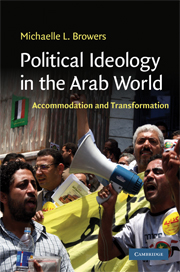Book contents
- Frontmatter
- Contents
- Acknowledgments
- Glossary
- Introduction: Ideological thought and practice in the Arab region
- 1 Retreat from secularism in Arab nationalist and socialist thought
- 2 A more inclusive Islamism? The wasatiyya trend
- 3 Framing a cross-ideological alliance
- 4 The Egyptian Movement for Change: Intellectual antecedents and generational conflicts
- 5 Yemen's Joint Meeting Parties: Origins and architects
- Conclusion: Ideological rapprochement, accommodation, transformation – and their limits
- Bibliography
- Index
- Cambridge Middle East Studies
1 - Retreat from secularism in Arab nationalist and socialist thought
Published online by Cambridge University Press: 22 January 2010
- Frontmatter
- Contents
- Acknowledgments
- Glossary
- Introduction: Ideological thought and practice in the Arab region
- 1 Retreat from secularism in Arab nationalist and socialist thought
- 2 A more inclusive Islamism? The wasatiyya trend
- 3 Framing a cross-ideological alliance
- 4 The Egyptian Movement for Change: Intellectual antecedents and generational conflicts
- 5 Yemen's Joint Meeting Parties: Origins and architects
- Conclusion: Ideological rapprochement, accommodation, transformation – and their limits
- Bibliography
- Index
- Cambridge Middle East Studies
Summary
Secular ideologies, particularly Arab nationalism and socialism, dominated the landscape of Arab political thought throughout much of the 1950s and 1960s. But as early as 1966, the Palestinian political scientist, Ibrahim Abu-Lughod (1929–2001), had begun to detect signs of a “retreat from the secular path” among intellectuals in the Arab region. The waning appeal of secular ideologies became increasingly apparent in the wake of the Arab–Israeli war of 1967, even though many of the first criticisms that emerged as part of the “self-criticism after the defeat” remained largely secular in character, with some intellectuals on the left asserting an even more uncompromisingly anti-religious stance. With the Arab–Israeli war of 1973, the idea that a unified Arab front was a precondition for successfully confronting Israel was challenged by state-based or more particularist Arab approaches to overcoming the weakness of Arab states vis-à-vis Israel. However, it is in the aftermath of the Islamic revolution in Iran that one sees most clearly not only a sharp rise in Islamist critiques of secular ideologies, but also the emergence of “new partisans of the heritage” (turathiyyun judud) from a seemingly unlikely source: within the ranks of Arab nationalists and socialists.
This chapter examines the political thought of various Arab nationalist and socialist intellectuals in whose writings one can detect development over time from a decidedly secular perspective to a reconsidered position that either places greater emphasis on Islamic authenticity as a necessary component of a national awakening or attempts to synthesize aspects of their thinking with Islamism.
- Type
- Chapter
- Information
- Political Ideology in the Arab WorldAccommodation and Transformation, pp. 19 - 47Publisher: Cambridge University PressPrint publication year: 2009



